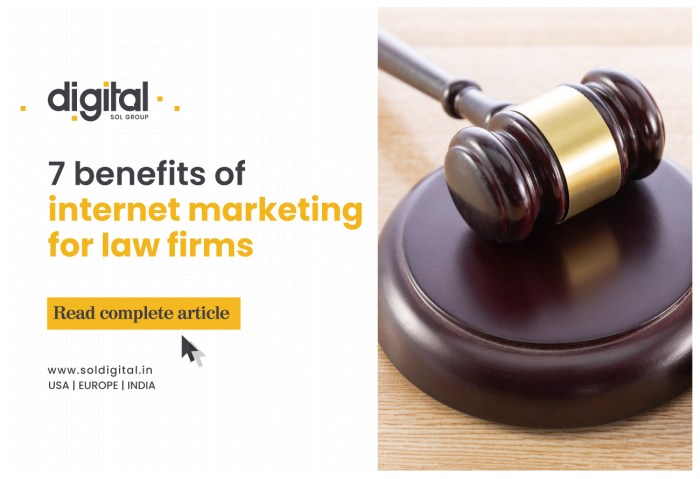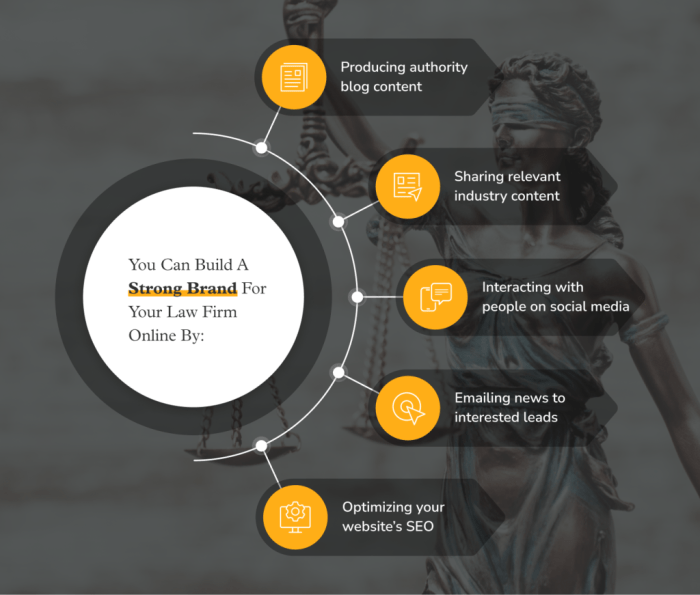Embark on the journey of establishing a robust legal brand through the power of internet marketing. From expanding your reach to enhancing credibility, this topic delves into the pivotal role of online strategies in shaping legal brands.
Importance of Internet Marketing for Legal Brands
Internet marketing plays a crucial role in helping legal brands expand their reach and connect with a wider audience in today's digital landscape. By leveraging various online platforms and strategies, legal firms can effectively showcase their services and expertise to potential clients.
Reaching a Wider Audience
Through search engine optimization () and targeted advertising, legal brands can increase their visibility online and reach potential clients who may not have been aware of their services otherwise. By creating compelling content and utilizing social media channels, legal firms can engage with a broader audience and establish a strong online presence.
Building Credibility and Trust
Internet marketing also plays a crucial role in building credibility and trust for legal brands. By consistently sharing valuable content, such as blog posts, case studies, and client testimonials, legal firms can showcase their expertise and establish themselves as authorities in their field.
Moreover, maintaining a professional and informative website can instill confidence in potential clients and help establish a positive reputation for the firm.
Strategies for Building a Strong Legal Brand Online

Building a strong online presence for a legal brand is crucial in today's digital world. By implementing key strategies, such as search engine optimization () and creating valuable content, law firms can enhance their visibility and engage effectively with their target audience.
Utilizing Search Engine Optimization ()
Search engine optimization () is a powerful tool that can help legal brands improve their online visibility. By optimizing their website with relevant s, creating high-quality content, and building backlinks from reputable sources, law firms can increase their rankings on search engine results pages.
This, in turn, can drive more organic traffic to their website and attract potential clients who are searching for legal services online.
Creating Valuable Content
In addition to , creating valuable content is essential for engaging with the target audience and establishing credibility in the legal industry. Law firms can share informative articles, blog posts, case studies, and other relevant content that addresses common legal issues and educates potential clients.
By providing valuable information, legal brands can build trust with their audience and position themselves as experts in their field.
Leveraging Social Media for Legal Branding
Social media has become an essential tool for businesses to connect with their target audience, and the legal industry is no exception. By leveraging social media platforms effectively, legal brands can enhance their visibility, engage with clients, and showcase their expertise in the field.
Popular Social Media Platforms for Legal Services
- LinkedIn: Ideal for networking with other professionals and sharing thought leadership content.
- Twitter: Great for quick updates, sharing news, and engaging in conversations with a wider audience.
- Facebook: Allows for connecting with clients on a more personal level and sharing informative content.
- Instagram: Perfect for visual storytelling and showcasing the human side of the legal practice.
How Social Media can be Used for Legal Branding
- Engagement: Interact with followers, respond to inquiries, and participate in discussions to build trust and credibility.
- Content Sharing: Share informative articles, blog posts, case studies, and success stories to showcase expertise and educate the audience.
- Client Testimonials: Encourage satisfied clients to leave reviews and testimonials, helping to build a positive reputation online.
Dos and Don’ts of Social Media Marketing for Legal Brands
- Do: Maintain a professional tone and ensure all content is accurate and up-to-date.
- Don't: Engage in controversial topics or share sensitive information about clients without consent.
- Do: Use visuals like infographics, videos, and images to make your content more engaging and shareable.
- Don't: Ignore comments or messages from followers, as this can damage your reputation and credibility.
Building Trust and Authority through Content Marketing

Content marketing plays a crucial role in establishing trust and authority for legal brands. By consistently providing valuable and informative content, legal firms can showcase their expertise, build credibility, and connect with their target audience on a deeper level.
Effective Content Marketing Strategies for Legal Firms
- Creating high-quality blog posts addressing common legal issues and providing practical advice.
- Producing informative videos explaining complex legal concepts in a simple and engaging manner.
- Offering downloadable resources such as e-books or guides to educate clients and establish expertise.
- Hosting webinars or online workshops to interact with clients in real-time and address their concerns.
Storytelling to Connect with Clients
Storytelling is a powerful tool that legal firms can use to connect with clients on a deeper level. By sharing real-life case studies, success stories, or client testimonials, firms can humanize their brand, evoke emotions, and build a stronger bond with their audience.
Through storytelling, legal brands can demonstrate empathy, understanding, and a genuine commitment to helping clients navigate legal challenges effectively.
Conclusive Thoughts
Concluding our discussion on Building a Strong Legal Brand with Internet Marketing, it's evident that leveraging online tools and platforms is key to thriving in the digital age. By implementing the right strategies, legal brands can solidify their presence and connect with audiences effectively.
Commonly Asked Questions
How can internet marketing help legal brands reach a wider audience?
Internet marketing enables legal brands to tap into a global audience by leveraging online channels like social media and search engines.
What are key strategies for establishing a strong online presence for a legal brand?
Key strategies include creating valuable content, optimizing for search engines, and engaging with audiences through social media.
Which social media platforms are suitable for promoting legal services?
Popular platforms like LinkedIn, Twitter, and Facebook are effective for showcasing legal services and engaging with clients.
How does storytelling contribute to connecting with clients on a deeper level?
Storytelling humanizes the legal brand, making it relatable and engaging for clients, thus fostering a deeper connection.



